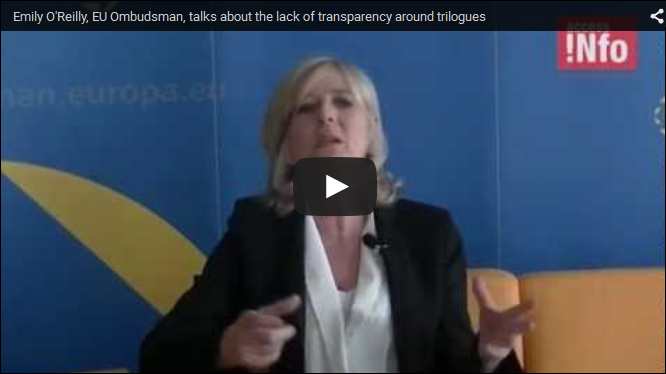Madrid, 28 May 2015 – Access Info Europe today welcomed the decision by the European Ombudsman to investigate the lack of transparency of “trilogues”, the informal and secretive negotiations between the EU’s Commission, Council and Parliament by which much future legislation is decided.
In spite of their crucial role in the legislative process, trilogues are closed meetings, and there is a severe lack of access to key information such as participants, agendas, minutes or documents considered.
Access Info has frequently criticised trilogues for violating the fundamental rights obligations of the EU treaties, which require that EU institutions “conduct their work as openly as possible” and “meet in public … when considering and voting on a draft legislative act.”
“It is high time to shine light into this dark corner of EU decision making,” said Helen Darbishire, Executive Director of Access Info Europe “Trilogue transparency is essential for true participation in and accountability of the way rules are adopted in Brussels.”
The EU Ombudsman mentioned to Access Info that trilogues were far too secret in an interview about the transparency of EU decision making. See the video, above, or check out our Youtube Channel.
In her decision today, Emily O’Reilly, European Ombudsman, explained: “Trilogues are where deals are done that affect every EU citizen. They are now an established feature of how the EU adopts laws. European citizens, businesses and organisations should be able to follow each stage of the law-making procedure and to understand how the negotiators arrive at the endpoint. Parliament, Council and Commission have a Treaty obligation and an interest in legislating as openly as possible to maintain public trust.”
Access Info is a specialist right to information group, based in Madrid and working across the European region, it has a special focus on promoting transparency of EU decision making. In 2013 Access Info won a case against the Council of the EU in which the pro-transparency group successfully defended the right of the public to have documents about the preparation of future EU legislation.
For more information, please contact:
Helen Darbishire | Access Info Europe
Contact us by email or +34 667 685 319

